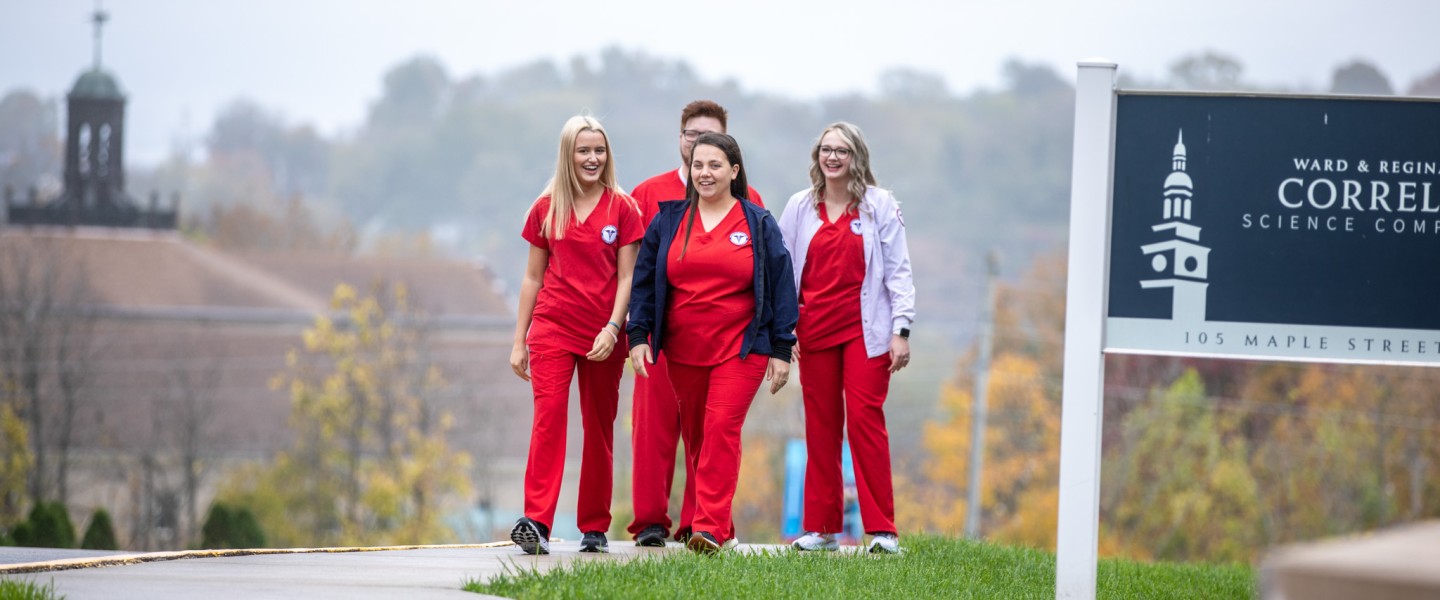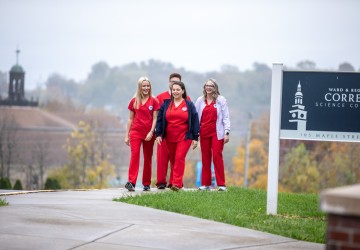Are you compassionate and caring? Are you a critical thinker? Are you adaptable and detail-oriented? Do you have great communication skills? Can you remain calm in high-pressure situations? If you can respond “yes” to questions like these, then you may have what it takes for a successful nursing career.
Whether you’re looking for a challenge, have a desire for great earning potential, or want a career filled with incredible job satisfaction, a nursing career could be your road to happiness. Read through these ten frequently asked questions about nursing school and then decide for yourself.
1. How hard is nursing school compared to other degrees?
This can be a difficult question to answer because it’s relative. For some, compared to the studies required as a pre-med major, nursing could be considered somewhat easy. Compared to the requirements to be an English major, nursing may be considered much more difficult. However, aptitude and interest in a field of study can make it easier to pursue.
Sure, getting through classes and the never-ending barrage of tests in nursing school can be stressful; however, STEM majors, such as biology and engineering, often rank higher in difficulty. That’s not to say that the pursuit of a nursing degree is a walk in the park, however.
Choosing or not choosing to be a nurse should not be based on factors such as public perception or prestige. Instead, career choices, such as nursing, should be based on interest and attributes that will bring fulfillment.
2. What are the different nursing degrees?
A nursing major can pursue various levels of nursing degrees which include:
- ADN — Associate Degree in Nursing
- BSN — Bachelor of Science in Nursing
- MSN — Master of Science in Nursing, specialties can include Nurse Practitioner (NP), Certified Nurse Midwife, Clinical Nurse Specialist (CNS), Certified Nurse Anesthetists (CRNA), Nurse Educator and more
- Doctorate — Doctor of Nursing, specialties can include Doctor of Nursing (ND), Doctor of Nursing Practice (DNP) and Doctor of Nursing Philosophy (Ph.D.)
3. How long does it take to become a nurse?
Length of time will depend upon the level of nursing degree that you decide to pursue. An ADN will take 2 years to complete. A BSN requires 4 years to complete; however, if the applicant already has an ADN, it may only take 1-2 years. An MSN requires an additional 1.5-2 years of study for someone who already has an ADN or BSN. Lastly, it can take approximately 6 years total to obtain a Doctorate in Nursing.
4. Can I get a nursing degree online?
At some point, a nursing program requires hands-on training with real patients. This means that even with online nursing programs, students need to gain experience through in-person clinical training to prepare them to work directly with real patients. Therefore, although the majority of program classwork can be completed online, students will be required to complete in-person clinical hours at a location that is approved by the school. Online programs with approved in-person clinical training are referred to as hybrid programs.
5. How much do nurses make?
Nurses make a good starting salary that increases over time and with additional education. The starting salary of a registered nurse with an ADN, however, is not all that much lower than a registered nurse with a BSN.
According to NursingProcess.org, the average entry-level salary of a newly graduated registered nurse with an ADN is approximately $51,280/year. This comes out to $4,270/month working full-time or $24.65/hour. Approximately 33% of all RNs across the country have an ADN. The average salary of all RNs with an ADN is $70,820/year, which comes out to $34.05/hour. The annual salaries of RNs with an ADN ranges between $47,100-$1000,700.
Likewise, according to NursingProcess.org, the average starting salary of a BSN nurse is $55,805, which comes to $26.83/hour; however, some registered nurses who have BSNs are salaried. The average annual salary for registered nurses with a BSN is $77,070/year.
Next up comes the salary range of nurses with an MSN. According to NursingProcess.org, nurses with an MSN can earn substantially more, especially after a few years of experience. The average entry-level salary for an MSN is $69,610. With 1-4 years of experience, the average salary jumps to $88,340. With 5-9 years of experience, the average is $104,910. For those with up to 19 years’ experience, the average salary is $126,770. With 20+ years, the salary average is $131,160.
Nurses in highly populated metropolitan areas typically make more than their counterparts in rural locations. Additionally, due to nursing shortages, overtime hourly rates are often higher.
6. Why are nurses important?
Healthcare would not be what it is today without the dedication and passion of nurses who are responsible for the care of patients in many capacities—doctor’s offices, hospitals, rehabilitation facilities and senior healthcare communities, to name a few. Nurses are the backbone of the healthcare system, carefully and compassionately administering and evaluating the treatment of their patients. They often work as an intermediary between patients and doctors, ensuring quality of care, making them their patients’ biggest advocate.
Nurses provide emotional support as well as physical care, providing comfort and stability when it is needed most. They have a broad knowledge base and exceptional people skills which allow them to care for patients in a wide range of situations, from newborns and their moms to patients with chronic illness to compassionately assisting someone who is facing death and everything in between.
7. Can nurses have tattoos?
Yes, a nurse can have tattoos; however, discretion is advised. Nursing associations haven’t taken a definitive stance on tattoos; therefore, the decision is generally left up to the employer. Most schools, hospitals and other places of employment have varying policies concerning tattoos. Some require them to be covered. Some ban placement from the neck, lower arms and hands. Others insist all tattoos be covered by regular scrubs and lab coats. If you want to get a tattoo, it’s best to keep it small, inoffensive (this can tricky ... what offends one person, may or may not offend another) and inconspicuous. Be sure to examine the tattoo policies of any desired future employers if you have a tattoo or want to get one.
8. What is evidence-based practice in nursing?
Evidence-based practice (EBP) or evidence-based nursing has been used consistently in modern nursing practice since the 1990s and is an essential component of a quality nursing curriculum.
According to the Journal of Nursing Administration, EBP is “an approach to healthcare that utilizes the most current research available to improve the health and safety of patients while reducing overall costs and variation in health outcomes.” In practice, EBP is applied problem-solving, using personal clinical expertise and recommended best practices from current medical literature while also taking into consideration the preferences and values of the patients for which care is being given.
Evidence-based nursing can be traced back to many of the practices Florence Nightingale implemented while supervising a barracks hospital in Scutari, Turkey during the Crimean War in the 1850s. She applied critical thinking skills, evidence (accurate observations), analysis and experimentation to improve patient outcomes despite the unsanitary conditions that existed in the hospital. Despite Nightingale’s obvious use of evidence-based practices, most literature credits Archie Cochrane, a physician in the 1970s, with its origination.
9. What is skilled nursing?
Skilled nursing is a term that is used to describe the care that is provided in a skilled nursing facility (SNF). Skilled nursing care refers to the services that are provided by or under the supervision of a licensed practical nurse or a registered nurse.
Skilled nursing care covers a wide range of needs, including physical therapy, occupation therapy, speech therapy and skilled nursing services such as:
- Post-surgical and post-hospital care
- Intravenous therapy
- Ventilator or tracheostomy care
- Internal feedings
- Incontinence, catheter and colostomy care
- Cardiac care
- Wound care
- Pulmonary rehabilitation
- Stroke recovery
- Neurological care
- Medication management
Some patients who require skilled nursing care are short-term or post-acute. They are generally recovering from surgery, an accident, a lengthy illness or a major health event such as a heart attack or stroke. Skilled nursing care helps these patients recuperate and return to their previous level of functioning.
Most patients, however, require long-term custodial and medically necessary care with 24-hour nursing supervision as well as assistance with most, if not all, activities of daily living such as bathing, dressing and ambulation. Once a patient requires this level of care, they may remain in the skilled nursing facility for the remainder of their lives. The nursing staff in a skilled nursing facility often become surrogate family members to the patients for which they provide care.
10. Can nurses write prescriptions?
As a general rule, nurses cannot write prescriptions; however, nurse practitioners can. A nurse practitioner is a registered nurse with an MSN or a DNP who has studied in a specific medical field. Working alongside physicians, nurse practitioners can also diagnose and treat sickness.
Become a Nursing Major at University of the Cumberlands
Nurses play a vital role in our nation’s healthcare industry. Nurses are in high demand and this demand continues to increase year after year. The profession of nursing is a true calling. If you feel you have this calling and want to learn more about the undergraduate or graduate nursing degrees offered at University of the Cumberlands, contact an admissions counselor or request more information today.

